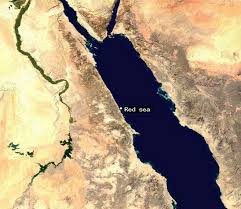Scramble for the Red Sea
YemenExtra
Wars could be triggered by the growing rivalry for control of what was once an ‘Arab Lake’
By: Abdel Bari Atwan
In decades past, the Red Sea used to be described as an ‘Arab Lake’. But a completely different impression is conveyed by the escalating regional and international struggle for control of the region these days, which could easily escalate into direct or proxy wars that further destabilise the littoral countries.
The Gulf crisis, the war in Yemen, and the various disputes focused on the waters of the River Nile, all threaten in one way or another to ‘militarize’ the region and create an unprecedented heightening of military and security tensions on both shores of the Red Sea – through which 13% of the world’s trade transits, including 18 million barrels of oil per day.
The three main countries that control the sea’s southern access route through the Strait of Bab al-Mandeb – Djbouti, Eritrea and Yemen – have become magnets for foreign military bases. The five permanent members of the UN Security Council – Russia, China, Britain, France and the United States – maintain naval facilities in Djibouti, as do Italy, Japan and Saudi Arabia. Israel and the UAE preferred to establish bases in nearby Eritrea, while Turkey chose Somalia and Sudan (Suakin) as the best locations for its expansion into the African continent and the Red Sea littoral.
A huge rock was thrown into the sea’s waters, which had been relatively placid in recent years, by Turkish President Recep Tayyip Erdogan’s three-day visit to Khartoum on 24 December. He signed 13 trade and security agreements with the Sudanese authorities, including one that granted Turkey a 99-year lease for the Red Sea island of Suakin.
Egypt is hyper-sensitive about Turkey’s moves on its southern flank, largely because of the close relationship between Erdogan’s ruling Justice and Development Party (AKP) and the Muslim Brotherhood movement which opposes the Egyptian regime. Cairo views the ‘pro-Brotherhood’ rapprochement between Turkey and Sudan as a direct threat. That is why it rolled out the red carpet for Eritrean President Isaias Afwerki when he visited last week to discuss forming a regional counter-alliance with support from Saudi Arabia and the UAE.
The Egyptian government did not comment on the Turkish president’s visit to Khartoum, but its media mouthpieces portrayed it – and especially the establishment of a Turkish military base on Suakin – as part of a conspiracy against Egypt’s national security. Erdogan – who publicly flaunted his identification with the Brotherhood during his earlier visit to Tunisia – makes no secret of his hostility to President Abdel Fattah as-Sisi and his government.
Strategic analysts point to rising tensions on the southern Egypt/eastern Sudan front, where an Egyptian-Eritrean alliance is now in a standoff against a Sudanese-Qatari alliance supported by Qatar. Reports of an Egyptian military deployment in Eritrea near the Sudanese border prompted Khartoum to declare a precautionary state of emergency in the border district of Kasala.
The Gulf states in the coalition that is boycotting Qatar support the Egyptian-Eritrean alliance because they do not want to see Turkey establishing a base on the Red Sea as it d in Qatar. The Turkish troop deployment in the emirate now exceeds 30,000, and has – so far, at least — secured Qatar against any military intervention.
Turkey acted astutely in pursuing its plans to expand its influence in Africa. It opened embassies in more than 40 African countries, and Erdogan visited many of them in person, accompanied by large delegations of business leaders who signed hundreds of trade and developments deals with their hosts. Turkey’s national airline also inaugurated several new routes between Istanbul and African capitals.
This is all highly distressing to Egypt, which was once Africa’s mover and shaker. It has not only lost almost all of its influence in the continent, but has hostile relations with a number of African states. These include Ethiopia, with whom tensions have risen over the Renaissance Dam whose opening will affect Egypt’s share of the Nile’s waters, as well as other Nile Basin countries such as Kenya and Uganda that are demanding an equitable water-sharing agreement, in addition to Sudan.
Many experts consider the prospect of a military confrontation developing between Egypt and Sudan to be far-fetched, as both countries are in dire economic straits and preoccupied with domestic wars on terror. Yet tensions are rising, and are being fuelled by external powers. Egyptian forces have arrived in Eritrea’ Sawa district. There is also speculation that a proxy war is being ignited in Sudan’s eastern Darfur region, where Sudanese President Omar al-Bashir accused Egypt of supplying armoured vehicles to rebel groups. The Egyptian president denied this, and went further by reassuring the Sudanese and Ethiopian governments that Egypt “will not get involved in wars against its brethren… nor conspire against anyone.”
Experience has taught us that nobody can tell when wars may break out, nor when they might end. The Yemen war is an example. Who would have imagined three years ago that Saudi Arabia, the UAE, Bahrain and Qatar (before it withdrew or was forced to withdraw from the coalition) – all considered to be peaceable countries that steered clear of wars – would send their warplanes to mount a relentless bombardment of Yemen?
The greatest wars are triggered by the smallest sparks. The Red Sea is heading for militarization, and global and regional powers are competing for control over it. It is sad that it is no longer the ‘Arab Lake’ it was for decades, if not centuries. That is due to the short-sightedness of the governments of the Arab littoral states, which squandered it just as they squandered other Arab seas and lands that are no less important – such as the Gulf, Iraq, Syria, Libya, Yemen and before that Palestine. The list is long indeed.

